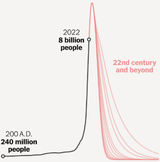>>509512964>Just increase production!Return on investment, especially for energy, is really difficult to improve once the power source is properly understood. Our BEST approach is probably to give up on unlimited energy and focus on making energy and technology capable of holding up over the long haul (thousands of years). Unfortunately, humans are greedy, and greedy approaches to problems are usually inefficient and socially un-optimal. Suppose everyone were to agree to not use a harmful energy source, because someone who did would gain a huge advantage if they did but harm everyone else. The ink wouldn't even have time to dry before national and personal interests violated that charter.
>Just reduce the population!Ignoring morality, dangerous both because it sets a precedent for political culling (never a good idea for long-term stability) and it also generates massive market instability including tremendous experience-to-demand losses in worker-practice time for now suddenly-needed roles and former roles becoming unnecessary.
System shock from the mass losses has unpredictable effects on other subsystems the current system relies on. Let's, say, get rid of "bourgoise indulgences" like cake-making, coffee shops, and wedding planning. Now huge portions of major cities have been hollowed out and there is no way to use that infrastructure (because it wasn't designed for 'useful' aims). Now what do you do? Do you tear up the city? That's expensive, and whoops, all of your 'willing' labor pool just vanished because you culled them. All of your essential workers can't be used because they're doing, well, ESSENTIAL jobs elsewhere. Other issues of this kind like recycling tech run into the same problem.
Moreover, people doing essential work efficiently don't have time to do indulgent things like create art for patrons. Additional superfice like that is a byproduct of having a lot of experts and an EXCESS of food/energy- and remember, we're trying to tighten our belts.











